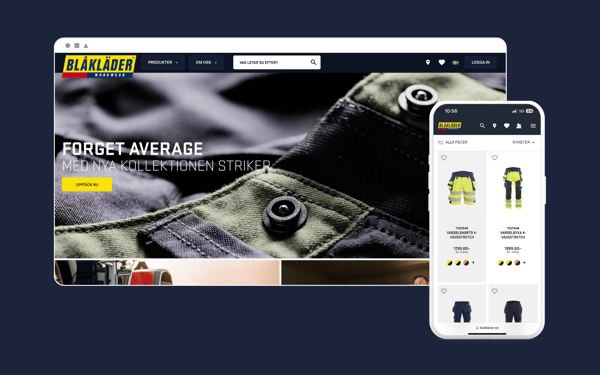Why modern B2B companies must accelerate their digital commerce strategies, and how to do it right.
With B2B buyers demanding faster, more transparent, and digital-first purchasing journeys, ecommerce is no longer optional, it’s business-critical. We sat down with Per Almhorn, Co-founder of the digital agency IVEO and a Norce Solution Partner with strong capabilities in B2B transformation, to explore the current landscape, real-world results, and what ambitious companies must do to stay ahead.
Why is digital sales gaining so much traction in B2B right now?
A recent PwC survey shows a dramatic shift in how B2B buyers want to interact. According to the data, 34% of all B2B sales now happen through ecommerce channels, and one third of buyers prefer digital over traditional touchpoints. For the second consecutive year, ecommerce ranks as the most efficient sales channel. Companies need to meet their customers where they are, and that’s increasingly online.
What are the key reasons companies invest in digital sales channels?
Availability is a big one. Buyers expect to place orders 24/7. Then there’s increased transparency, better exposure of full product assortments, and the ability to handle more transactions without hiring more sales reps. We’re also seeing a generational shift, younger procurement professionals expect a digital, self-service experience. It’s all about enabling scalable growth with less friction.
How do buyers perceive this shift?
Efficiency is the main driver from the buyer’s side. The PwC survey shows that buyers appreciate the improved speed and transparency digital tools offer. It’s not just about convenience, it's about performance. We’ve moved from “nice-to-have” to “must-have” in terms of UX and digital capabilities.
Are there any standout success stories you've seen recently?
Yes, absolutely – we have two client examples:
A great example is a Nordic distributor of haircare products and a Norce customer. After launching their ecommerce solution, they increased revenue by 30% and reduced their sales team by over 50%. Another Norce client in the B2B space saw a 30% higher average order value and a 12% higher contribution margin on customer-placed orders versus those placed by sales reps, in just the first few months after launch.
What are the common challenges in digitalizing B2B sales?
B2B processes are more complex than B2C, customized pricing, delivery terms, approvals, negotiated discounts, you name it. Companies also struggle with internal change management, especially in sales organizations. But with the right platform and mindset, these challenges can be turned into competitive advantages.
How do modern digital tools help address those complexities?
The most effective solutions give both customers and sales teams powerful features. Customers can view assortments, place complex orders, manage deliveries, and even cancel within certain timeframes. Sales reps can see customer carts, generate quotes, adjust discounts, and intervene directly in the ordering process, all within the same interface. It's a unified experience with smart permissions and automation.
What trends do you see shaping the future of B2B commerce?
The market is moving toward modular, API-first, and composable commerce setups, like Norce Commerce, that enable flexibility and integration with the broader tech stack.
AI is, of course, a major trend right now. Although adoption in traditional B2B sectors tends to lag behind, we’re working on several initiatives that use AI to improve the B2B buying experience. Innovations I believe have strong potential for long term impact.
According to the PwC survey, digitalization efforts are expected to increase by 70% between 2024 and 2027. That includes deeper self-service, better data utilization, and even tighter integration between digital and human assisted channels.
What advice do you have for companies just starting out?
Don’t wait. Start by mapping your current processes and identifying friction points. Choose a scalable platform that supports your long term goals, modularity and headless architecture are key. Work with a partner who understands both technology and B2B business logic. And remember, digital sales is not just about technology. It’s about transforming how you serve your customers.
Conclusion
B2B commerce is entering a new era, one defined by rising buyer expectations, data-driven sales processes, and scalable technology. As Per Almhorn puts it, those who embrace digital sales now won’t just keep up, they’ll lead.
.jpg)

-2.png?width=600&name=Mail%20images%20600x400%20(1)-2.png)
